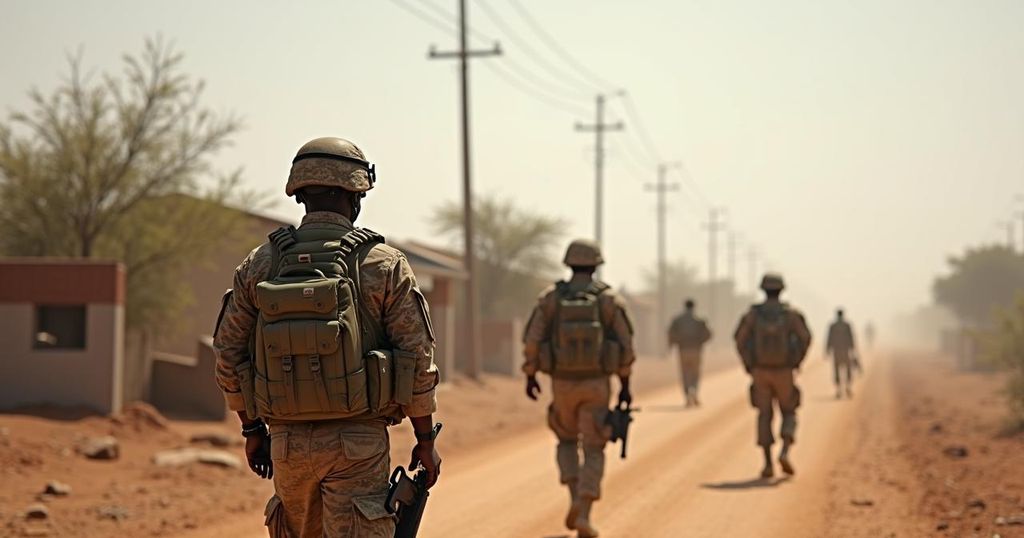Egypt’s Military Expansion in Somalia: A Strategic Move Against Ethiopian Withdrawal
Egypt is ramping up its military presence in Somalia ahead of the December deadline for Ethiopian troop withdrawal. The military collaboration includes training Somali forces and addressing threats from militant groups. Following a military agreement signed in August, Egypt has dispatched military assets to Mogadishu. These developments are rooted in long-standing tensions between Egypt and Ethiopia over Nile water rights and Ethiopia’s dam project, exacerbating regional security challenges.
Egypt is actively enhancing its military mission in Somalia in anticipation of the forthcoming December 31 deadline for the withdrawal of Ethiopian troops from the region. According to sources reported by The National, Egypt is providing training and support to Somali security forces to combat Al Qaeda-affiliated militants. This military partnership between Egypt and Somalia, both members of the Arab League, was solidified through a significant cooperation agreement established in August. Since then, there has been a notable influx of Egyptian military assets, including weapons, advisors, trainers, and specialists in counter-terrorism, into Mogadishu. By the year’s end, it is projected that thousands of Egyptian personnel will be actively engaged in this mission. Currently, Ethiopia maintains approximately 22,000 troops in Somalia, under agreements that encompass both a bilateral pact and participation in an African Union peacekeeping force aimed at supporting Somalia’s fight against Al Shabab. Relations between Egypt and Somalia are increasingly strained with Ethiopia due to concerns over a Nile dam project and territorial agreements involving Somaliland, which jeopardize Somalia’s sovereignty. Egypt has committed to taking the place of Ethiopian peacekeeping forces once they withdraw, a move that Somalia has endorsed. In proactive measures, some Somali forces, trained and supported by Egypt, have been positioned along supply routes used by Ethiopian troops to inhibit any potential reinforcement just prior to the deadline. Ethiopia has countered Egypt’s military engagement in Somalia by bolstering its own troop presence and expressing apprehensions regarding the implications of external arms on regional stability, citing fears that such transfers could ultimately empower terrorist factions like Al Shabab. The Ethiopian government, through its President at the time, voiced concern about the fragile security of Somalia and the risks associated with a surge in arms from external sources. Somalia’s Foreign Minister responded vigorously, suggesting that Ethiopia’s accusations were a mere distraction from its own issues related to arms smuggling across borders, affecting both civilians and insurgent groups. The intricate dynamics of the Nile water dispute have fueled tensions between Egypt, Ethiopia, and Sudan, with ongoing negotiations failing to yield satisfactory agreements regarding the Grand Ethiopian Renaissance Dam. Despite Ethiopia’s assertions assuring that their dam project would not impede the interests of Egypt and Sudan, Cairo remains resolute in advocating for a legally binding accord related to the operation and reservoir filling of the dam. Recent talks involving Egyptian President Abdel Fattah El Sisi emphasized the existential nature of the River Nile for Egypt, framing the river as vital for the survival of the nation. This context illustrates Egypt’s endeavors to garner support from neighboring nations in the Horn of Africa, further manifested in military agreements and strategic partnerships aimed at confronting Ethiopian assertiveness. Recent dialogues with Somali and Eritrean leaders, particularly a summit held in Asmara, highlighted Egypt’s commitment to supporting Somalia in regaining stability and security amidst ongoing regional challenges. Egypt’s engagement with Eritrea, in light of deteriorating relations with Ethiopia, underscores its strategic positioning. The complexities of these relationships, punctuated by historical grievances and geopolitical rivalries, continue to shape the landscape of security and diplomacy in the Horn of Africa.
The dynamics in the Horn of Africa are extremely intricate, involving long-standing geopolitical rivalries and recent escalations in military activity. Egypt and Ethiopia have been locked in a protracted dispute centered around the Nile River and its resources, particularly concerning the Grand Ethiopian Renaissance Dam. Ethiopia’s construction of the dam is viewed by Egypt as a direct threat to its water supply, prompting Egypt to seek allies and bolster military capabilities in neighboring countries, notably Somalia. The presence of Ethiopian troops in Somalia, paired with the emergence of extremist groups like Al Shabab, further complicates security efforts in the area. The recent military cooperation agreement between Egypt and Somalia signifies a larger strategy by Cairo to establish a foothold in the region, countering Ethiopian influence while maintaining stability.
In summary, Egypt’s military escalation in Somalia reflects its strategic objectives in the region, particularly with the imminent withdrawal of Ethiopian forces. The cooperation with Somali security forces against militant threats, combined with military support, indicates a responsive approach to perceived threats from Ethiopia. Moreover, Egypt’s diplomatic overtures towards Somalia and Eritrea serve to reinforce its commitment to regional stability amidst ongoing disputes over water resources and sovereignty. The situation continues to evolve as regional powers navigate complex interdependencies and historical animosities.
Original Source: www.thenationalnews.com




Post Comment